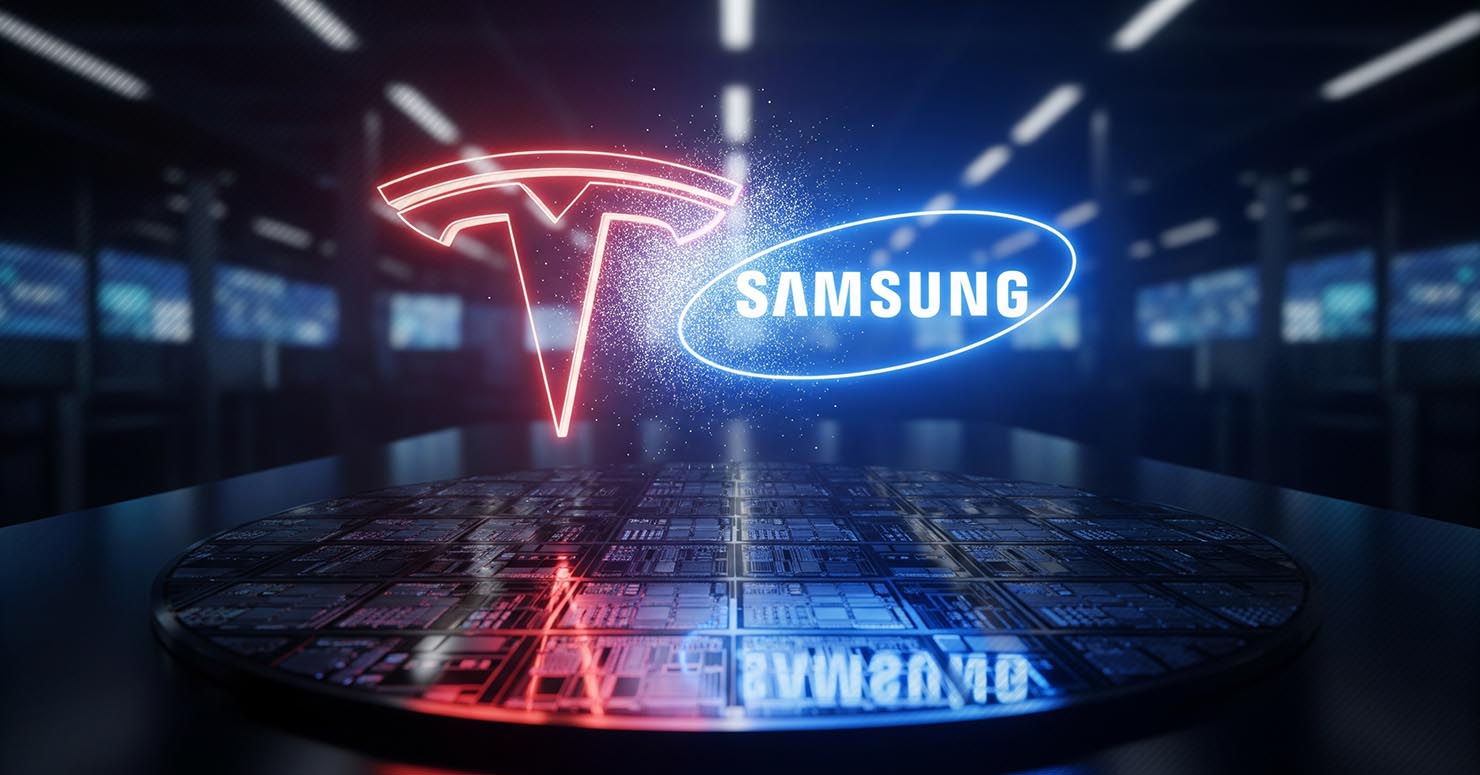In one of the largest and most strategic agreements in the history of the electric vehicle sector, Tesla has signed a monumental $16.5 billion deal with Samsung to develop and supply a new generation of custom artificial intelligence chips. Codenamed “A1,” these chips are set to become the new brain for Tesla’s entire ecosystem, from its Full Self-Driving (FSD) system to its future robotics projects.
This landmark Tesla Samsung AI chip deal is more than just a massive purchase order; it’s a calculated power move. It signals Tesla’s intent to deepen its control over its core technology, secure its supply chain for years to come, and strategically reduce its reliance on its current AI hardware partner, Nvidia.
This news brief by our Lead Analyst, Hashim Haque, breaks down the significance of this deal and what it means for the future of autonomous technology.
The “A1” Chip: A Custom Brain for Full Self-Driving
The new “A1” chips will be produced using Samsung’s most advanced fabrication technology. They are being designed from the ground up to handle the immense computational load required by Tesla’s neural networks, which are trained on billions of miles of real-world driving data.
The goal is to achieve a massive leap in performance for:
- Faster Data Processing: Enabling the car to analyze data from its cameras and sensors in real-time.
- Improved Object Recognition: More accurately identifying pedestrians, vehicles, and obstacles.
- Enhanced Decision-Making: Allowing the FSD system to make safer and more nuanced driving decisions.
This level of performance is critical for Tesla to achieve its ultimate goal of fully autonomous driving.
A Strategic Pivot Away from Nvidia
Perhaps the most significant implication of the Tesla Samsung AI chip deal is what it means for the company’s relationship with Nvidia. While Tesla has used Nvidia chips in the past, this massive investment in a custom-designed alternative is a clear move to bring its most critical component in-house.
This strategy offers several key advantages:
- Supply Chain Security: It secures a steady supply of cutting-edge chips, a crucial lesson learned after seeing how Tesla survived the chip shortage while others faltered.
- Cost and Performance Optimization: Custom silicon allows Tesla to design a chip that is perfectly tailored to its software, potentially offering better performance at a lower cost than off-the-shelf solutions.
- Reduced Reliance: It lessens Tesla’s dependence on a single supplier that is also becoming a major player in the broader Auto Tech space.
This mirrors the pragmatic approach seen in the Tesla China AI partnership, where the company makes strategic alliances to secure its long-term goals.
Why Samsung? A Partnership of Titans
Samsung’s selection as the manufacturing partner is a testament to its prowess in the semiconductor industry. As one of the few companies in the world capable of producing the most advanced chips at scale, Samsung’s foundry business is a global powerhouse.
This partnership brings together two titans: the world’s most valuable automaker and one of its most advanced technology manufacturers. The success of this collaboration will not only define the future of Tesla’s vehicles but could also reshape the entire automotive AI landscape, a constant concern for the Tesla brand reputation.
Frequently Asked Questions (FAQ)
1. What is the Tesla Samsung AI chip deal?
It is a reported $16.5 billion agreement where Samsung will manufacture a new, custom-designed “A1” AI chip for Tesla to power its future vehicles, FSD system, and other AI projects.
2. Why is Tesla moving away from Nvidia?
By developing its own custom chip with Samsung, Tesla gains more control over its technology roadmap, optimizes performance for its specific needs, and reduces its strategic dependence on a single, powerful supplier like Nvidia.
3. What is Full Self-Driving (FSD)?
Full Self-Driving is Tesla’s advanced driver-assistance system that aims to achieve fully autonomous driving capabilities through a sophisticated neural network trained on real-world driving data.
4. Why is this deal important for the auto industry?
This massive deal underscores the critical importance of custom, high-performance AI chips in the future of mobility. It signals a trend where leading automakers are behaving more like tech companies, taking control of their core semiconductor technology.
